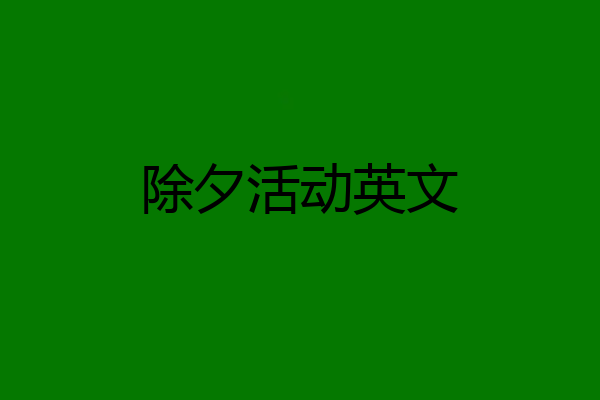
阿拉丁摸神灯
除夕的英文New Year's Eve。
除夕,为岁末的最后一天夜晚。岁末的最后一天称为“岁除”,意为旧岁至此而除,另换新岁。除,即去除之意;夕,指夜晚。“除夕”是岁除之夜的意思,又称大年夜、除夕夜、除夜等,时值年尾的最后一个晚上。
除夕是除旧布新、阖家团圆、祭祀祖先的日子,与清明节、七月半、重阳节是中国民间传统的祭祖大节。除夕,在国人心中是具有特殊意义的,这个年尾最重要的日子,漂泊再远的游子也是要赶着回家去和家人团聚,在爆竹声中辞旧岁,烟花满天迎新春。
在童话传说中古代有一只四角四足的恶兽——夕,因冬季大雪覆盖而短缺了食物常到附近的村庄里去找吃的,因其身体庞大、脾气暴躁、凶猛异常,给村民带来了很大的灾难。每到腊月底,人们都整理衣物扶老携幼,到附近的竹林里躲避夕。
后来一聪明的孩子教大家除掉夕的方法,他的名字就叫做“年”。因为“夕”没有死,所以每年的腊月三十,大家都守着碎竹节等待着,希望早日除掉“夕”。
可是一年年过去了,谁也没有再见过“夕”,有的只是大家为防止“夕”的到来燃放的爆竹与门前挂的红布条,然而却给我们留下了这个传说与过年的习俗:腊月三十的夜里,大家齐聚一堂吃着年夜饭,一起守岁等待除夕的钟声。
放爆竹,贴门联。等到天亮彼此走访邻里给予问候与祝福。初一早上乡亲们彼此走访看看相邻有没有受伤说一些吉祥客气的话。希望来年的腊月“夕”不再来。


vera911213
1、过年 Guo-nian; have the Spring Festival
2、除夕 New Year's Eve;
3、初一 the beginning of New Year
4、元宵节 The Lantern Festival
5、饺子 dumpling
6、辞旧岁 bid farewell to the old year
7、扫房 spring cleaning; general house-cleaning Blessings
8、守岁 staying-up
9、饺子 dumpling
10、放鞭炮: squibbing firecrackers
11、贴春联: paste the New Year couplets
12、吃年夜饭: take/have New Year's Eve Dinner
13、看春节晚会:watch Spring Festival Gala on TV
14、发红包: hand out red envelopes
15、买年货: special purchases for the Spring Festival ; do Spring Festival shopping
16、敬酒: propose a toast
17、守岁: staying-up
18、拜年: give New Year's greetings; New Year's visit
19、吃汤圆: eat Tangyuan (Glutinous Rice Balls)
20、灯会: exhibit of lanterns
21、祭祖宗 offer sacrifices to one's ancestor
22、舞狮 lion dance
23、舞龙 dragon dance
24、剪纸 paper-cuts
25、年画 New Year paintings
扩展资料:
春节是中国四大传统节日之一,是一年之岁首,传统上的农历新年。
春节俗称“年节”,传统名称为新年、大年、岁首、新岁,口头上又称度岁、过年。
春节历史悠久,是由上古时代岁首祭祀活动演变来,其起源蕴含着深邃的人文与自然文化内涵。
在民间,旧时传统意义上的春节是指从腊月的腊祭或腊月二十三或二十四的祭灶,一直到正月十九日。在现代,人们把春节定于农历正月初一,但一般至少要到农历正月十五(元宵节)新年才算结束。
参考资料:
百度百科-春节

爱林公主
有关于春节习俗的英语单词:
1、春节 Chinese New Year
2、除夕 Chinese New Year's Eve
3、春运 spring migration
4、农历 the lunar calendar
5、生肖 zodiac animal
6、春联 Paper scrolls
7、春晚 the Chunwan Gala
8、舞龙 dragon dance
9、舞狮 lion dance
10、庙会 Temple Fair
11、烟花 fireworks
12、红包 red envelope
13、压岁钱 gift money
14、鞭炮 firecrackers
15、灯笼 lantern
16、守岁 staying-up
17、拜年 New Year's visit
18、团圆饭 family reunion dinner
19、年夜饭 the dinner on New Year's Eve
20、饺子 dumpling
和春节相关的习俗
春节(Spring Festival)
Spring Festival falls on a different date each year. According to the lunar calendar, it's dictated by the first new moon closest to the beginning of spring.
中国的春节每年的日期都不一样。根据农历,春节的具体时间是最接近春天开始的第一个新月日。
春联(Paper scrolls)
Paper scrolls are normally put up on both sides of the doorway. There are certain strict rules to mirror the words, like if there is a character on the left-hand side that saying, sky, for example, there should be one on the right-hand side saying ground, and if there is rain, there is wind. If there is red, there is green. So it is kind of a thing that brings good blessing and good wishes for the New Year.
春联一般贴在门的两边。词的对仗有很严格的规定,如果左联上有一字,比如“天”字,右联必须有个“地”字,“雨”对“风”,“红”对“绿”。因此是语意万千,希望新年带来祝福和好运。
扩展资料:
大年初一需要注意规矩:
Rule number one.
第一条规矩。
No medicine on the first day of the lunar New Year, because it is believed that if you take any medicine on the first day of the year, you will be ill all year. That is no good.
农历大年初一不能吃药,据说如果你在初一吃了药,你全年身体都会不好。这可不妙。
Rule two, no porridge.
第二条,不能喝粥。
It is a peasant food and you will be eating poor food and be poor all year if you eat porridge on the first day of the year.
据说粥是以前乡下人吃的东西,吃了穷人的东西就会变穷,新年第一天喝了粥,一年都可能会穷。
Rule three, no sweeping.
第三条,不能打扫卫生。
Because it means you are sweeping away the wealth of the new year to come. Make sense.
如果搞了卫生,就会把新年里的财运统统扫掉,有道理
优质英语培训问答知识库